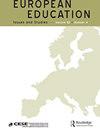《课堂》与《你给的仇恨》媒体评论
IF 0.9
Q4 EDUCATION & EDUCATIONAL RESEARCH
引用次数: 0
摘要
如何支持学生在智力和情感上理清和应对教育中的系统性压迫,是本期媒体评论的主题。特别是对于拥有特权的学生来说,发生在教室和校园里的对历史上边缘化群体的微观(和宏观)侵犯,反映了更大的社会不平等,可能是不透明的,令人困惑的和不相关的(Benson, 2013)。电影可以更发自内心地呈现无形的、多层次的压迫,作为一种语言本身,通过社会关系表达生活经验、真实性和参与(Agha, 2007),这是文本文件永远无法做到的。两部电影提供了考察理论概念的机会,如文化资本(布迪厄,1991年)、融合(阿格尔和斯特朗,2008年)、逃亡(坎普,2014年)和异语(巴赫金,1981年),通过跨大洲和几十年的精选主题和人物:2008年法国的《阶级》和2018年美国的《你给予的仇恨》。在这篇简短的评论中,我们无法解决所有可能的问题,我们首先总结每部电影,然后简要分析语言的象征力量(布迪厄,1991)。最后,我们建议为大学水平的教育课程提供额外的关键问题和教学工具。本文章由计算机程序翻译,如有差异,请以英文原文为准。
Media Review of “Entre Les Murs (the Class)” and “The Hate U Give”
How to support students to intellectually and emotionally untangle and grapple with systemic oppression in education is the subject of this media review. Especially for students carrying privilege, the micro(and macro-) aggressions toward historically marginalized groups that occur in classrooms and school yards and that reflect larger societal inequalities, can be opaque, confusing and unrelatable (Benson, 2013). Film can present the often intangible and multilayered oppression more viscerally, as a kind of language itself, that expresses lived experience, authenticity, and involvement across and through social relations (Agha, 2007) in ways textual documents can never do. Two films offer opportunities for examining theoretical concepts such as cultural capital (Bourdieu, 1991), integration (Ager & Strang, 2008), fugitivity (Campt, 2014) and heteroglossia (Bakhtin, 1981) through selected themes and characters across continents and decades: Entre les Murs (The Class) from 2008 France and The Hate U Give from 2018 United States. Unable to tackle all possible issues in this short review, we first summarize each film then briefly analyze the symbolic power of language (Bourdieu, 1991). To conclude we suggest additional critical questions and teaching tools for university-level education courses.
求助全文
通过发布文献求助,成功后即可免费获取论文全文。
去求助
来源期刊

European Education
EDUCATION & EDUCATIONAL RESEARCH-
CiteScore
1.20
自引率
0.00%
发文量
5
期刊介绍:
uropean Education is published in association with the Comparative Education Society in Europe (CESE). It is an international peer-reviewed journal devoted to original inquiries and dialogue on education across the member states of the Council of Europe. Established in 1969, the journal features articles on education in individual member states, comparative studies on education across Europe, as well as the impact of European education initiatives globally. The journal especially encourages theoretical and empirical studies, interdisciplinary perspectives, and critical examination of the impact of political, economic, and social forces on education. European Education includes reviews of books and educational films, including those published/produced in English and other languages.
 求助内容:
求助内容: 应助结果提醒方式:
应助结果提醒方式:


